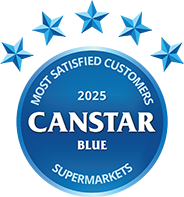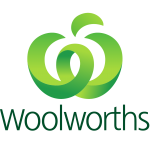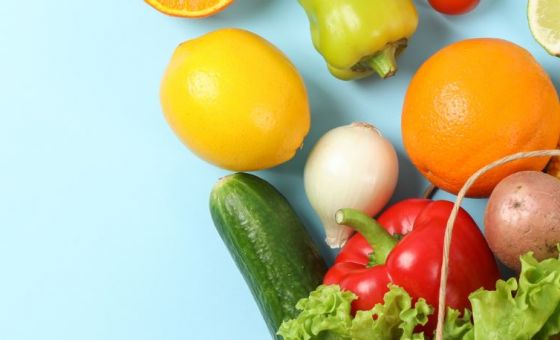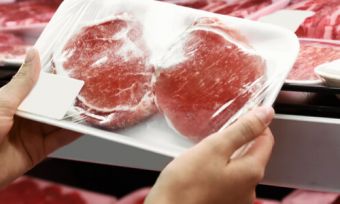
Aussies have rated Aldi as the top pick in Canstar Blue’s supermarket ratings for the eighth year in a row, with five-star reviews for value for money, freshness of fruit, vegetables and meat, store and website layout and presentation, quality of supermarket-owned branded products and overall satisfaction.
The average weekly grocery bill for an Australian household of four people has climbed to $240, a $24 increase from the previous year, according to Canstar Blue’s 2025 survey of supermarket shoppers. The survey, which gathered insights from 2,869 shoppers, highlights the ongoing cost-of-living pressures facing consumers at the checkout.
In response to rising prices, Australians are becoming more strategic with their supermarket shopping, hunting down specials, shopping across multiple supermarkets and maximising rewards points.
Our survey revealed a significant difference in weekly grocery spending depending on where you live. Households in Tasmania reported the highest average spend at $227 a week, while those in the Northern Territory reported the lowest, spending an average of $160. This highlights a wide variation in grocery budgets across the country, which could be influenced by a range of factors beyond local pricing.
We asked Australians to tell us the most important thing a supermarket could offer them and the answer came back loud and clear: low prices.
The majority of survey respondents (63%) said they want low prices across all products, not just specials. Meanwhile, 15% said they want convenience when they shop, with a suitable location and easy access to parking. Eleven percent of respondents said variety of products was most important to them, while 10% said rewards points, offers or collectables mattered most.
Advertisement
Helping you find great value!
Shop Woolworths online to get your weekly dose of savings.
T&Cs and exclusions apply.^
Even with new security measures like camera technology and weighted bays, a small number of Australians admit to cheating the system at the self-service checkout. The survey revealed 4% of shoppers have deliberately stolen an item, while a further 4% confessed to mis-scanning a product as something cheaper to reduce their bill.
Our review compares supermarket brands on customer satisfaction, so you can find out what other Aussies think about the compared brands before you go ahead with a purchase. Think of it as like asking hundreds of your closest mates which supermarket brand they think is best!
Canstar Blue surveyed 2,869 Australians for their feedback on the supermarket brand(s) they’ve made a purchase from in the last month.
The winning brand is the one that receives the highest overall satisfaction rating once all the scores from the overall satisfaction criteria are combined and averaged.
Brands must have received at least 30 responses to be included, so not all brands available in the market have been compared in this survey. The brands rated in this survey are listed below in order of best overall satisfaction.
Find more detailed information on our Most Satisfied Customer methodology.

Since launching in Australia in 2001, Aldi has established itself as a supermarket favourite among budget-savvy shoppers. The German grocery chain is able to keep prices down for customers by focusing on its own home-brand products and eliminating frills such as overhead music in stores. Add the famous ‘Special Buys’ middle aisle to the mix, and you’ve got a combination of everyday value and weekly surprises that many Aussies appreciate.

As one of Australia’s largest supermarket chains, Coles offers a comprehensive range of groceries, fresh produce, and household essentials. The brand is known for its extensive private label selection, which includes the budget-friendly Coles brand and the premium Coles Finest range. Customers can also collect points and rewards through the widespread Flybuys loyalty program. Its vast network of physical stores is complemented by a robust online shopping and Click & Collect service for added convenience.

Operating as a nationwide network of independent, family-owned businesses, IGA offers a unique community-focused shopping experience. This structure allows individual stores to tailor their stock to local tastes, often featuring products from area farmers and suppliers not found in larger chains. While store sizes vary, this local-first approach is consistent. The brand’s value is supported by its long-standing Black and Gold private label, which provides a wide range of budget-friendly grocery and household staples.

Woolworths is one of Australia’s major supermarkets, branding itself as ‘The Fresh Food People’ with a strong emphasis on produce and fresh groceries. Its product selection is complemented by a diverse own-brand lineup, including the health-focused Macro Wholefoods Market range. The Everyday Rewards program allows customers to earn points on their spending. A vast network of stores combined with extensive online, delivery, and Direct to Boot services ensures shopping is convenient for customers nationwide.
Not all brands in the market qualify for our ratings (based on minimum survey sample size), but that doesn’t mean they’re not worth considering. Here are several more brands to check out before making a purchase decision.
Advertisement
Helping you find great value!
Shop Woolworths online to get your weekly dose of savings.
T&Cs and exclusions apply.^

This article was written by Canstar Blue Consumer Content Producer, Rachel Bollerman. Rachel graduated with a Bachelor of Communications, majoring in Journalism at the Queensland University of Technology in 2021. She has worked in public relations, marketing and communications roles at Jessica Cotton PR & Marketing and the Institute for Urban Indigenous Health. Gaining experience in broadcast journalism and blog writing, Rachel has also interned at 4ZZZ Community Radio and Fishburners.
When she’s not working, Rachel enjoys doing arts and crafts projects at home, watching true crime and spending time with friends. You can follow Rachel on LinkedIn.

Grace is in the final semester of her Bachelor of Advanced Business (Honours) degree at The University of Queensland, majoring in Business Analytics and Marketing. Her studies have equipped her with strong capabilities in data analysis and consumer research. Grace began her journey with Canstar in early 2025 as a casual research assistant and has since progressed into her current role, where she oversees the consumer research ratings across a wide range of product and service categories. She is responsible for survey design and consumer data analysis, and enjoys her focus on uncovering insights that inform Canstar Blue’s ratings and awards and help support consumers to make more informed decisions.
Here are the past winners from Canstar Blue’s supermarket ratings:

Best-Rated Baby High Chairs - August 11th
Aussie households spend on average $178 per week on groceries, according to Canstar Blue’s July 2025 survey of supermarket shoppers.
– Read more
Best-Rated Breakfast Cereal - December 7th
Meat is a costly part of the weekly shop for many Australians. Weighing up cost, cut and type and choosing which supermarket to purchase from can make a real difference when it comes to quality …
– Read more
Best-Rated Chewing Gum Brand - June 3rd
Woolworths will stop selling its 15-cent reusable plastic shopping bags nationwide over the next year. It’s the first supermarket to pledge to remove all plastic shopping bags for good.
The reusable plastic shopping bags will be …
– Read more
Best-Rated Baked Beans Brand - May 3rd
Did you know there’s a much faster way to shop and get through checkout queues at Woolworths?
The Woolies app has a little-known DIY feature − Scan&Go − that allows shoppers to scan grocery barcodes on …

Best-Rated Block Cheese Brand - October 14th
Put those tasteless celery sticks away! We know that choosing snacks to keep hunger pangs AND that extra bulge at bay can be hard, especially if you’re short on time or just looking for a …
– Read more^By clicking on a shop online, compare now, buy online, more details or check latest prices button, you may leave Canstar Blue and be taken to a referral partner to compare. Canstar Blue may be paid for this referral. You agree that Canstar Blue’s terms and conditions apply to this referral. If you click on a brand that is not a referral partner, you will be taken to a brand page on Canstar Blue.
Canstar Blue may earn a fee for referrals from its website tables, and from sponsorship of certain products. Fees payable by product providers for referrals and sponsorship may vary between providers. Generally, sponsorship fees are payable in addition to referral fees. Sponsored products are clearly disclosed as such on website pages. They may appear in a number of areas of the website such as in comparison tables, on hub pages and in articles. Sponsored products may be displayed in a fixed position in a table, regardless of the product's rating, price or other attributes. The table position of a Sponsored product does not indicate any ranking or rating by Canstar. The table position of a Sponsored product does not change when a consumer changes the sort order of the table. For more information please see How Are We Funded. Payment of fees for ads does not influence our Star Ratings or Awards.
*Prices correct as of publication date.
